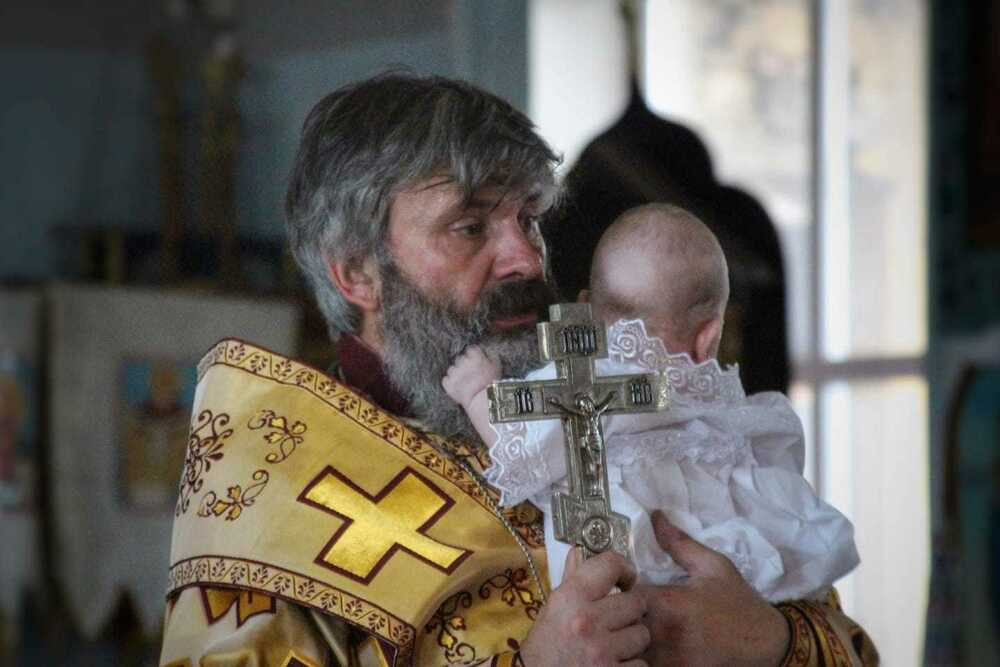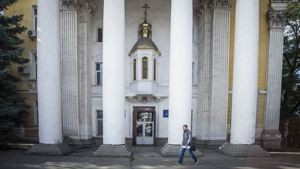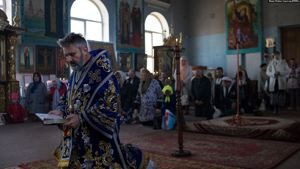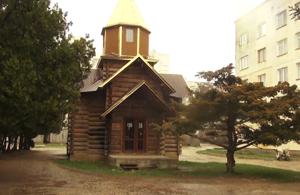Russian authorities in Crimea continuing attempts to crush religious communities.

After Russian occupation authorities seized all the Orthodox Church of Ukraine's places of worship in Crimea and its priests fled after at least some received summonses for mobilisation, Metropolitan Kliment says its Crimean Diocese "has effectively ceased to exist". The authorities are targeting independent mosques unaffiliated with the Crimean Muslim Board. The Russian Police's Centre for Countering Extremism and other agencies raid mosques and community members' homes. All 6 known 2023 prosecutions for "illegal" missionary activity targeted independent Muslims. Jehovah's Witnesses are targeted with raids and jailings.
The last seven parishes of the Orthodox Church of Ukraine's Crimean Diocese have stopped functioning and the Diocese "has effectively ceased to exist", diocesan head Metropolitan Kliment (Kushch) said in November. The Russian occupation authorities have seized its places of worship and its priests have fled fearing mobilisation into the Russian army.
The Orthodox Church of Ukraine was recognised as canonical by the Ecumenical Patriarchate in 2019. It is separate from the Russian Orthodox Church Moscow Patriarchate and its affiliate in government-held Ukraine, the Ukrainian Orthodox Church.
In May, court bailiffs led by Yevgeny Novikov seized the Crimean Diocese's cathedral in Crimea's capital Simferopol. Crimea's Property and Land Ministry insisted that the seizure of the cathedral premises was "conducted on a legal basis". It said the Crimean Diocese had "failed to bring its founding documents into accordance with the laws of the Russian Federation within the established timeframe".
Novikov, who heads the Crimean Inter-District Bailiffs' Department for the Execution of Special Enforcement Proceedings, denied that the cathedral or its movable property was seized, or that he had been involved. "I wasn't there," he told Forum 18 from Simferopol. "Nothing was taken. Your information does not accord with reality".
The Russian occupation authorities are similarly seeking to crush the activity of independent Muslim communities which are not affiliated with the Crimean Muslim Board. Independent mosques face inspections and raids, and courts fine those leading prayers without state and Muslim Board permission.
Following raids by the Russian Police's Centre for Countering Extremism on Alushta's independent Yukhary-Jami mosque and the homes of three mosque leaders in late November, the three leaders were jailed for several days. The Imam now faces prosecution for "illegal" missionary activity, while the mosque faces prosecution for allegedly storing "extremist" literature.
Early on 13 December, the Russian Police's Centre for Countering Extremism raided the home of Imam Ismail Yurdamov in Kirov District in eastern Crimea. They searched his home, checked whether any of his books were banned as "extremist", then took him to the police station, where officers drew up a record of an offence against him for "illegal" missionary activity.
Asked why officers had raided Imam Yurdamov's home, an officer of Kirov District Police – who would not give his name – told Forum 18: "They provided documents for the search." He confirmed that Senior Lieutenant Roman Filatov of the Centre for Countering Extremism had come from Simferopol to lead the raid. Asked why Imam Yurdamov faces prosecution on charges of conducting "illegal" missionary activity, the officer responded: "It is confidential information. I don't consider it necessary to answer your questions".
All six cases known to have been brought in Crimea in 2023 on charges of conducting "illegal" missionary activity have been to punish those leading prayers in mosques without state approval.
Decisions by Russia's Supreme Court to ban as "extremist" the Muslim missionary movement Tabligh Jamaat (in 2009) and Jehovah's Witnesses (in 2017) mean that anyone whose exercise of freedom of religion or belief is perceived to be linked to these groups faces arrest and imprisonment.
Four members of Tabligh Jamaat were arrested in October 2017 for meeting to discuss their faith. Renat Suleimanov was jailed for four years (he was freed at the end of his sentence in December 2020), while the others served suspended sentences.
In May, July and August, officials of the Russian Investigative Committee and FSB security service – many of them armed and some masked – raided Jehovah's Witness homes across Crimea. Crimean courts have already jailed 12 Jehovah's Witnesses and handed down 2 more suspended sentences, with trials or criminal investigations underway against a further 16 (see forthcoming F18News article).
Major Yelena Yatsenko, acting deputy head of the Information Department of the Russian Police in Crimea, refused to answer any questions about police involvement in raiding and threatening religious communities. "I can't answer any of your questions at present. Send an official request in writing," she told Forum 18 from Simferopol. "You will need to show that you have accreditation as a media outlet in the Russian Federation."
Major Yatsenko appeared to laugh when Forum 18 described how police had been present and threatened community members during Friday prayers at Alushta's Yukhary-Jami mosque. She then denied that she had laughed.
Officials at the Russian Police's Centre for Countering Extremism in Simferopol did not answer the telephone each time Forum 18 called between 6 and 14 December.
Russia's illegal March 2014 annexation of Crimea is not recognised by Ukraine or internationally. The Russian authorities in Crimea use the wide range of available laws and regulations to punish communities that meet for worship in ways and places the authorities do not like.
Orthodox Diocese "has effectively ceased to exist"
"On 16 November 2023, Metropolitan Kliment (Kushch), head of the Orthodox Church of Ukraine's Crimean Diocese, told Voice of Crimea news website that the last seven of the Diocese's parishes have stopped functioning and the Diocese "has effectively ceased to exist".

All of the Crimean Diocese's priests have left Crimea and are "in a safe place", Metropolitan Kliment added. "The main reason for this is that the priests and their families had to leave the territory of Crimea, because there was already a real threat of their mobilisation to the Russian army, summonses were received."
(Russia blocked access to the Voice of Crimea website on 29 August 2023.)
The Crimean Justice Ministry had rejected the registration application from the Simferopol parish, most recently in September 2019. It claimed there were "violations" in the documents presented. A Justice Ministry official insisted to Forum 18 from Simferopol in December 2019 that "nothing in principle" obstructs the registration of communities of the Orthodox Church of Ukraine.
Russian occupation officials subjected Orthodox Church of Ukraine priests and communities to surveillance and pressure.
On 8 August 2021, officials from the Russian Police's Centre for Countering Extremism raided the Sunday morning worship service at its small St Demetrius of Thessaloniki monastery in Belogorsk. Major Vladimir Gorevanov drew up a record of an offence against Pavel Skokov (Archimandrite Damian) under Russian Administrative Code Article 5.26, Part 4 ("Russians conducting missionary activity"). On 23 August 2021, Belogorsk Magistrate's Court No. 32 fined him 15,000 Russian Roubles (about two weeks' average wage).
On 15 March 2022, Pavel Skokov (Archimandrite Damian) lodged a case against Russia at the European Court of Human Rights in Strasbourg (Application No. 24345/22).
Officials seize Orthodox Church of Ukraine's cathedral
In early May 2023, the Russian authorities in Simferopol finally seized Sts Volodymyr and Olga Cathedral of the Crimean Diocese of the Orthodox Church of Ukraine. The community had worshipped in the rented premises since 1995.

Officials of the Crimean State Property Fund broke down the doors to gain entry and seized the cathedral's property, the editor of Krymska Svitlitsvya Andrei Shchekun told Radio Free Europe's Crimean Service on 11 May.
The bailiffs changed all the locks on the building and put seals on each door. They did not allow parishioners to approach. Shchekun said the seizure of the cathedral was led by Yevgeny Novikov, the then acting Deputy Head of the Russian court bailiff service in Crimea.
Crimea's Property and Land Ministry insisted on its website on 11 May that the seizure of the cathedral premises "is being conducted on a legal basis". It said the Crimean Diocese had "failed to bring its founding documents into accordance with the laws of the Russian Federation within the established timeframe".
Novikov, who heads the Crimean Inter-District Bailiffs' Department for the Execution of Special Enforcement Proceedings, denied that the cathedral or its movable property was seized, or that he had been involved. "I wasn't there," he told Forum 18 from Simferopol on 13 December. "Nothing was taken. Your information does not accord with reality."
Court bailiffs were fulfilling a decision by Crimea's Arbitration Court ordering the diocese to vacate the building, the Property and Land Ministry added. "After completing these measures, the Ministry plans to hand the premises for the use of the Russian Orthodox Church to hold services and other religious activity."
The Ministry insisted that all the Crimean Diocese's movable property would be stored until it receives a request from the Diocese as to what to do with it.
The May 2023 eviction came after the Diocese failed to defend its rights through the Russian courts.
On 28 June 2019, the Crimean Arbitration Court ordered the dissolution of the lease agreement for the Cathedral signed in 2002 between the Ukrainian Crimean Property Fund and the Crimean Diocese of what was then the Orthodox Church under the Kyiv Patriarchate. The Arbitration Court rejected the Crimean Diocese's subsequent suits to overturn or delay implementation of the decision.
On 4 August 2020, Russia's Supreme Court in Moscow finally refused to reconsider the decision to evict the congregation from the Cathedral, human rights lawyer Serghiy Zayets noted on Facebook the same day.
Russia ignored UN Human Rights Committee Interim Measures
On 28 August 2019, 62 parishioners lodged a complaint to the United Nations Human Rights Committee (3651/2019). On 6 September 2019, the UN Human Rights Committee issued Interim Measures, requesting Russia "not to evict [the first applicant] and his congregation from the building of their Church in Simferopol, while their case is under consideration by the Committee". The Human Rights Committee has not yet issued a decision on the substance of the complaint.
The Russian authorities ignored the UN Human Rights Committee request. "The Russian government provided its objections and I then submitted objections to the Committee on behalf of the applicants," Zayets told Forum 18 from Lviv on 12 December 2023. "After further correspondence in English, the Russian government wrote on 8 April 2022 that they would not consider individual communications and related materials received from human rights treaty bodies without an official translation into Russian. The UN Committee requested us to translate the document."
Six Ukrainian Orthodox cases at European Court of Human Rights
The European Court of Human Rights (ECtHR) in Strasbourg is also considering five cases lodged against Russia between 2017 and 2020 by communities of the Ukrainian Orthodox Church Kyiv Patriarchate and its successor, the Orthodox Church of Ukraine (Application Nos 69421/17, 420/19, 22986/19, 31609/19, 33585/20). Human rights lawyer Serghiy Zayets represents the applicants.

The applicants complain that "the Russian Government initiated a process of elimination of the Ukrainian Orthodox Church in Crimea". They argue that "the obligation to undergo the procedure of re-registration under Russian law in Crimea amounts to an interference with its right to freedom of religion which does not pursue a legitimate aim and which is not proportionate". They also complain of "deprivation of its right to use its premises, seizure of property and attempts to demolish the Church's building". They note that they are "treated less favourably than other religious organisations in Crimea", particularly the Russian Orthodox Church.
The Court asked the Russian authorities about these cases on 28 October 2022.
"The Russian government sent initial observations to the European Court of Human Rights, but stopped doing so in spring 2022," Zayets told Forum 18.
In March 2022, Russia withdrew from the Council of Europe and the ECtHR after its renewed invasion of Ukraine, and in June 2022 passed legislation which renders all ECtHR judgments which entered legal force since 15 March 2022 unenforceable in Russia.
On 16 January 2023, the Orthodox Church of Ukraine's Icon of the Mother of God of the Unburnt Bush parish in Yevpatoriya lodged a case against Russia to the ECtHR over court decisions to demolish its chapel (Application No. 6584/23). The parish built the wooden chapel in 2013 before the Russian annexation of Crimea. Yevpatoriya City Court ordered the parish to destroy its chapel in November 2019. The chapel appears still to be standing, although the Orthodox Church of Ukraine no longer has use of it.
Failing to give full official legal name
Russian Administrative Code Article 5.26, Part 3 punishes "Implementation of activities by a religious organisation without indicating its official full name, including the issuing or distribution, within the framework of missionary activity, of literature and printed audio, and video material without a label bearing this name, or with an incomplete or deliberately false label".
Cases against two individuals (though cases are supposed to be brought only against organisations, not against individuals) are known to have been brought to court in Crimea in 2023 under this provision:
- On 13 December, Judge Ulluby Isayev of Yalta Magistrate's Court No. 100 fined Baptist Pastor Denis Kovalenko 30,000 Russian Roubles.
- On 13 April, Judge Ivan Kuvshinov of Kirov Magistrate's Court No. 53 acquitted Dmitry Koretsky, priest of a local Russian Orthodox parish.
The 2 known prosecutions in Russian-occupied Crimea in 2023 for failing to use a full official legal name show a reduction in the number of such prosecutions compared to earlier years.
- In 2022, 9 such prosecutions were brought against 5 religious communities and 3 individuals (one twice).
- In 2021, 10 such prosecutions were brought against 10 religious communities.
- In 2020, 20 such prosecutions were brought against 20 religious communities.
- In 2019, 11 such prosecutions were brought against 10 religious communities and one individual.
- In 2018, 17 such prosecutions were brought against 12 religious communities and 5 individuals.
Source: Forum 18
Author: Felix Corley